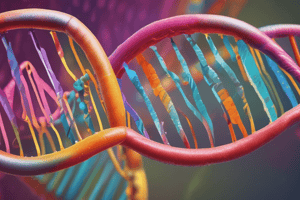Podcast
Questions and Answers
What is the primary focus of the study of genetic and genomic variation in medicine?
What is the primary focus of the study of genetic and genomic variation in medicine?
- Understanding environmental factors affecting health
- Examining genetic diversity and its implications for human health (correct)
- Exploring the relationship between genetics and behavior
- Analyzing the impacts of technological advances in genetics
Which of the following describes a manifestation of genetic diversity?
Which of the following describes a manifestation of genetic diversity?
- Lack of nucleotide changes in the genome
- Increased susceptibility to certain infections (correct)
- Identical protein structures in all tissues
- High uniformity in gene sequence across individuals
What percentage of nuclear DNA is generally identical between any two unrelated humans?
What percentage of nuclear DNA is generally identical between any two unrelated humans?
- 90.5%
- 99.0%
- 100.0%
- 99.5% (correct)
How do many DNA sequence differences affect outward appearance?
How do many DNA sequence differences affect outward appearance?
Which of the following is considered an extreme manifestation of genetic differences?
Which of the following is considered an extreme manifestation of genetic differences?
Which concept best represents the range of genetic variability?
Which concept best represents the range of genetic variability?
What variability might genetic differences influence beyond health?
What variability might genetic differences influence beyond health?
Which of the following is NOT a genetic variation mentioned in the context?
Which of the following is NOT a genetic variation mentioned in the context?
Flashcards
Genetic Variation
Genetic Variation
Differences in genetic material among individuals, arising from nucleotide changes, genome organization variations, copy number variations, or protein structure/amount differences.
Human Genetic Similarity
Human Genetic Similarity
The human genome is approximately 99.5% identical between unrelated individuals.
Genetic Variability in Humans
Genetic Variability in Humans
The small fraction of sequence differences among individuals that leads to diverse traits, including physical attributes, health conditions, and even predispositions.
Disease-Causing Variation
Disease-Causing Variation
Signup and view all the flashcards
Non-Disease-Related Variation
Non-Disease-Related Variation
Signup and view all the flashcards
Genetic Disease Spectrum
Genetic Disease Spectrum
Signup and view all the flashcards
Copy Number Variation
Copy Number Variation
Signup and view all the flashcards
Genome Sequence Variation
Genome Sequence Variation
Signup and view all the flashcards
Study Notes
Genetic Variation in Medicine
- Genetic and genomic variation is fundamental to human and medical genetics.
- Evolution introduces new nucleotide variations, creating high genetic diversity and individuality.
- Genetic diversity manifests in genome organization, nucleotide changes, copy number variations, protein structural/amount differences, or combinations in disease contexts.
DNA Sequence Differences
- Human nuclear DNA sequences are ~99.5% identical between unrelated individuals.
- The remaining ~0.5% difference drives genetic variability, impacting daily life and clinical medicine.
- Some DNA sequence variations have minimal phenotypic impact, while others cause disease.
- Intermediate variations affect anatomy, physiology, dietary tolerances, disease susceptibility, cancer predisposition, medication responses, and potentially personality traits, athletic ability, and artistic talents.
Disease and Genetic Variation
- Inherited diseases are the most noticeable, but extreme examples of genetic variation.
- A spectrum of variations exists, ranging from rare, harmful variants causing diseases, to more frequent susceptibility-increasing variants, to common, potentially disease-irrelevant variants.
Studying That Suits You
Use AI to generate personalized quizzes and flashcards to suit your learning preferences.




